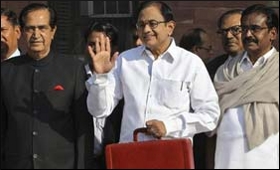|

|
Budget: UPA finally moving towards capitalism
|
|

|
|
| Top Stories |
 |
|
|
|
Amulya Ganguli | 03 Mar, 2013
Finance Minister P. Chidambaram's claims to be a reformer may have received a glancing blow with the 10 percent surcharge on the super-rich in Thursday's budget proposals, but the fall of the axe on 42,800 people who earn Rs.10 million a year is small price to pay for his reluctance to take more drastic steps against the wealthy.
What this unwillingness to soak the rich, a favourite pastime of socialists, shows is that the government may have finally won the battle against the Leftists in the Congress, who, as a Left-leaning newspaper of Chennai felt, were more "clued in" to the demands of the aam admi than the supposedly Rightist prime minister. It can perhaps be said, therefore, that the government and the party are finally moving, even if slowly, towards a capitalist economy.
The fear about the rich being taxed was expressed during the run-up to the budget, mainly because it was felt that the government's capabilities to finance the profligate welfare programmes of the Congress were limited. This was more so at a time of low growth and low investment.
But, if the tax structure has not been tampered with in a major way except for those individuals who, according to the finance minister, believe along with business magnate Azim Premji that the rich have a duty to contribute to the national exchequer, the reason perhaps is that the Leftists in the party and government have realized that the reforms cannot be rolled back.
Moreover, the minister has indicated that this imposition is a one-time affair. Premji, too, has welcomed the move, describing it as politically correct. At the same time, while no tears need be shed on the levying of duties on SUVs - or "socially useless vehicles", as Jairam Ramesh once called them - or on "smart" phones, the trend shows that the old belief that the aam admi will vote for a government which extracts money from the rich may not have completely died out.
On the other hand, the value of growth, which used to be earlier mocked because their benefits were assumed to be only for the "greedy" corporate sector, is now being gradually appreciated. It is not without reason, therefore, that Chidambaram spoke of the need for getting back to eight percent growth rate and argued about the "imperative" nature of foreign investment.
The neo-liberal brigade used to speak hesitantly about these initiatives earlier. Now, the climate is more conducive to reforms because the high fiscal deficit, high inflation, low growth and low savings have left no alternative but for greater globalization and deregulation.
That the language of reforms is being spoken, albeit cautiously, when it is believed that the present budget may be the last one before the next general election, which may even be brought forward to the end of this year, denotes the realization in the government that the so-called LPG - liberalization, privatization, globalization - route to economic development has wide acceptance, and not only among the "neo middle class" identified by Narendra Modi, the children of the post-1991 reforms period who have become much more affluent than their parents.
It is possible that this change of mood, ironically, has been the result of the slowdown, which made many people, especially in the poorer sections, aware that the only way there can be greater employment opportunities is by revving up the economy with the injection of capital by domestic and foreign investors. As a result, disinvestment is no longer derided as the sale of family silver except by the hardcore Left.
This is not to say that populism is on its way out. Instead, Chidambaram pointed out that the "flagship programmes have been fully and adequately funded". Foremost among them is the rural employment scheme which was believed by the former National Advisory Council member, Harsh Mander, to be responsible for the Congress's 2009 victory. Although the food security bill is yet to be approved of by parliament, the budget has set aside Rs.100 billion for providing foodgrains at subsidised rates to nearly 70 percent of the population of 1.2 billion.
This largesse has been undertaken presumably because Congress president Sonia Gandhi believes that it will be the winning card in 2014 as the employment scheme was in 2009. These spendthrift policies suggest that the government does not intend to do away with subsidies.
There are other conflicting signals. For instance, against the industry's expectation of a rollback of retrospective taxation, the government has announced its intention to introduce a modified General Anti-Avoidance Rule (GAAR) from 2016.
Although it has been called a "please all" budget (except for the "super rich"), the Sensex's unenthusiastic response showed how the urge is in favour of more reforms than what is on offer. The credit rating agencies, however, have been more cheerful.
(Amulya Ganguli is a political analyst. He can be reached at amulyaganguli@gmail.com)
|
|
|
| |
|
|
|
|
|
|
|
|
|
|
|
|
|
|
| |
| Customs Exchange Rates |
| Currency |
Import |
Export |
US Dollar
|
₹91.35
|
89.65 |
UK Pound
|
₹125.3
|
₹121.3 |
Euro
|
₹108.5
|
₹104.85 |
| Japanese
Yen |
₹58.65 |
₹56.8 |
| As on 19 Feb, 2026 |
|
|
| Daily Poll |
 |
 |
| What is your primary "Make or Break" expectation from the Finance Minister this year? |
|
|
|
|
|
| Commented Stories |
 |
|
|
|
|
|
| |
|